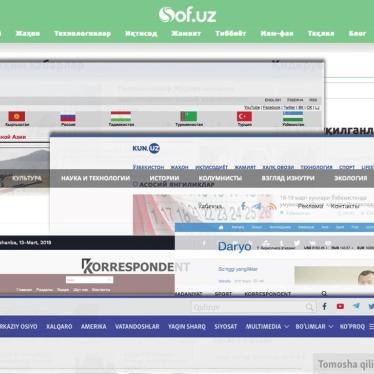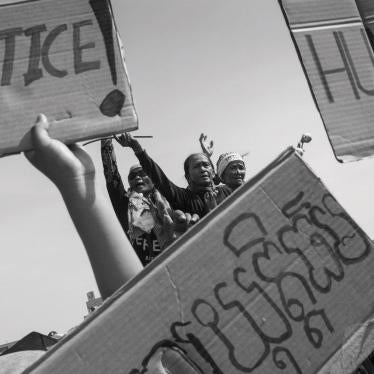The event on October 2 and 3, "Liberalization of Mass Media - An Important Component of the Democratization of the Society," was co-sponsored by the EU and the Uzbek government. This seminar was welcome. But it should not be seen by EU foreign ministers, who will consider the sanctions at their meeting on October 13, as an indication that Uzbekistan has improved its human rights record.
The EU must not close its eyes to the harsh realities that journalists face in Uzbekistan. Our organizations, which took part in the seminar, can attest that nothing new was heard from the representatives of the government and the state-controlled media who were present. There was no hint of acknowledgement that the country's media are neither free nor independent, that journalists and others are regularly imprisoned for expressing their opinions, that access to critical external internet sites is blocked and that foreign journalists are not allowed accreditation to cover the country from within.
Indeed, foreign journalists and independent Uzbek journalists were not allowed to cover last week's seminar.
When EU ministers meet next week, they should make it clear that there have been no positive changes in media freedom in Uzbekistan and insist that the authorities demonstrate a real commitment to freedom of expression through concrete actions. The EU should call on the Uzbek government to take a series of steps:
- In line with Article 19 of the Universal Declaration of Human Rights and Article 19 of the International Covenant on Civil and Political Rights, to which Uzbekistan is party, both of which guarantee the right to freedom of expression:
- end state censorship of all forms of protected expression;
- cease harassment and intimidation of independent journalists working in the country;
- lift reporting restrictions on all domestic and international media outlets;
- promptly and unconditionally release journalists wrongfully detained for their professional activities and others detained for exercising their freedom of expression;
- allow international media outlets, including those that have been forced to stop working in Uzbekistan, to register their bureaus and grant accreditation to international journalists; - Require public trials in line with Article 11 of the Universal Declaration of Human Rights and Article 14 of the International Covenant on Civil and Political Rights, allowing Uzbek and foreign journalists and other independent monitors to cover criminal proceedings inside the courtrooms;
- Issue an invitation to monitor its actions relating to press freedom to the UN Special Rapporteur on Freedom of Expression, as well as the Special Rapporteur on Torture and the Special Representative on Human Rights Defenders.
Meetings such as last week's seminar, and indeed any form of open discussion and dialogue, are certainly to be welcomed if they lead to genuine change. However, the EU must make it absolutely clear to Uzbekistan that a willingness to talk is not the same thing as a commitment to embark on substantive improvements in policy and practice. The Uzbek government's past record of engagement with the EU and other international institutions clearly demonstrates that discussions of possible reforms have consistently been used as a substitute for real and measurable progress. They may be no more than a decoy designed to extract concessions at no cost to the Uzbek authorities.
Amnesty International, EU Office
Article 19
La Fédération Internationale des Droits de l'Homme
Human Rights Watch
Institute for War and Peace Reporting
International Crisis Group
Open Society Institute






